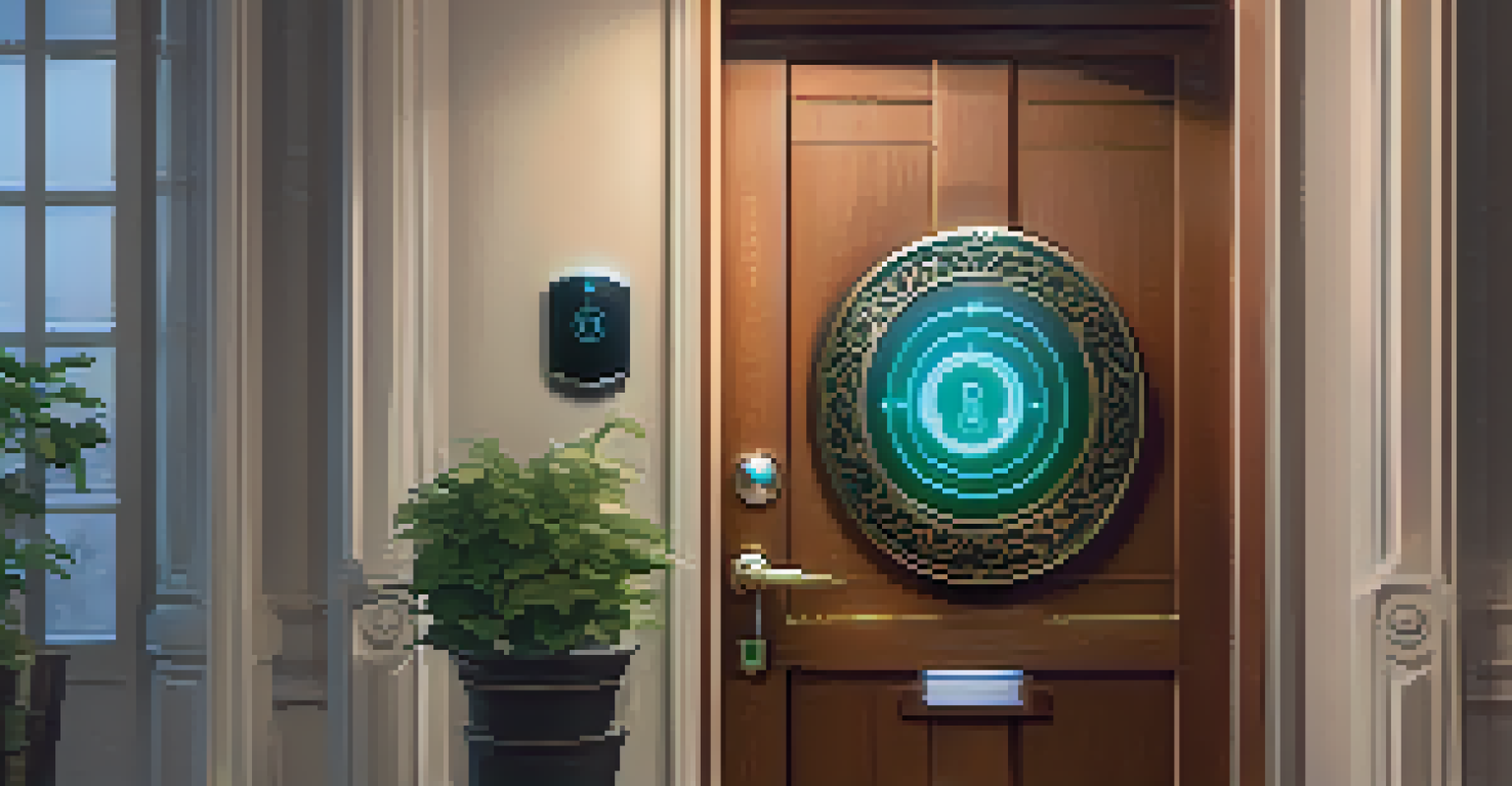Smart Contracts: Automating IoT Processes on Ethereum

Understanding Smart Contracts in the IoT Landscape
Smart contracts are self-executing contracts with the terms of the agreement directly written into code. In the Internet of Things (IoT) realm, they play a crucial role by automating processes without human intervention. This automation allows devices to communicate and operate seamlessly, enhancing efficiency and reducing errors.
Smart contracts allow us to create trust in a world where trust is often absent.
By leveraging smart contracts, IoT devices can execute tasks based on predefined conditions. For instance, a smart thermostat could automatically adjust the temperature when it detects that the house is empty. This level of automation not only saves energy but also improves user comfort and convenience.
Moreover, smart contracts enhance security and transparency in IoT transactions. Since they operate on a decentralized blockchain, the data is immutable, making it difficult for malicious actors to tamper with. This intrinsic security feature is vital in the IoT domain, where devices often handle sensitive information.
The Role of Ethereum in Smart Contract Development
Ethereum is a leading blockchain platform that enables developers to create and deploy smart contracts. Its flexibility and robust infrastructure make it an ideal choice for IoT applications. By using Ethereum, developers can write contracts that are not only secure but also capable of interacting with other decentralized applications.

One of the key advantages of Ethereum is its active community and extensive documentation, which support developers in overcoming challenges during the development process. This collaborative environment fosters innovation, encouraging more sophisticated IoT solutions to emerge. For example, developers can utilize Ethereum's existing libraries to speed up their project timelines.
Smart Contracts Automate IoT Processes
Smart contracts enable IoT devices to execute tasks automatically based on predefined conditions, enhancing efficiency and user convenience.
Additionally, Ethereum's support for decentralized finance (DeFi) opens up new opportunities for IoT devices. Imagine a scenario where smart meters automatically settle energy usage bills using Ethereum's native cryptocurrency, Ether. This integration can streamline payments and create a more efficient economy around energy consumption.
How Smart Contracts Enhance IoT Security
Security is a significant concern in the IoT space, where devices are often vulnerable to hacks and data breaches. Smart contracts enhance security by automating processes and ensuring that only authorized devices can interact with one another. This minimizes the risk of unauthorized access and data manipulation.
The IoT is not just about connecting devices; it's about connecting people and processes in a way that was previously unimaginable.
For instance, consider a smart lock that uses a smart contract to manage access permissions. When a user requests entry, the smart contract verifies their identity against the blockchain before unlocking the door. This not only secures the entry point but also provides a transparent log of access attempts.
Furthermore, the decentralized nature of blockchain technology means that there is no central point of failure. In the event of a cyberattack, the network continues to function normally, protecting the integrity of the IoT system. This resilience is essential for applications in critical sectors such as healthcare or transportation.
Real-World Applications of Smart Contracts in IoT
Numerous industries are beginning to harness the power of smart contracts in IoT applications. For example, agriculture is using these contracts to automate irrigation systems, ensuring that crops receive the right amount of water based on real-time soil moisture data. This optimizes resource use and boosts crop yields.
In supply chain management, smart contracts can track products from production to delivery. Each time a product changes hands, the smart contract updates its status on the blockchain, ensuring transparency and accountability. This not only reduces fraud but also enhances trust among stakeholders.
Ethereum Powers Smart Contract Innovation
Ethereum's robust platform supports the development of secure and adaptable smart contracts, fostering innovation in IoT applications.
Moreover, smart contracts are paving the way for autonomous vehicles. These vehicles can communicate with one another and execute transactions for services like charging or maintenance without human intervention. This automation could revolutionize transportation, making it safer and more efficient.
Challenges of Implementing Smart Contracts in IoT
Despite their potential, implementing smart contracts in IoT is not without challenges. One of the primary hurdles is the technical complexity involved in developing and deploying these contracts. Developers must have a solid understanding of both IoT systems and blockchain technology to create effective solutions.
Another challenge is the scalability of blockchain networks. As the number of IoT devices increases, the volume of transactions on the blockchain can overwhelm the network. This can lead to slower processing times and higher costs, which may hinder widespread adoption of smart contracts in IoT.
Lastly, regulatory issues pose a significant barrier. The legal landscape surrounding smart contracts is still evolving, and uncertainties regarding compliance can deter businesses from fully embracing this technology. Clear regulations are essential for fostering innovation and ensuring that smart contracts can operate effectively in various industries.
The Future of Smart Contracts in IoT Innovations
Looking ahead, the future of smart contracts in IoT is incredibly promising. As technology continues to advance, we can expect more sophisticated and user-friendly solutions to emerge. These innovations will likely drive greater efficiency and expand the reach of IoT applications across various sectors.
The integration of artificial intelligence (AI) with smart contracts could further enhance automation in IoT. For example, AI algorithms could analyze data collected from IoT devices and adjust smart contract parameters in real-time. This would enable even more responsive and adaptive systems that can cater to dynamic user needs.
Security Enhancements Through Automation
Smart contracts improve IoT security by automating processes and ensuring that only authorized devices can interact, reducing risks of hacks.
Additionally, as consumer awareness of blockchain technology grows, demand for smart contract solutions is likely to increase. Businesses that adopt these technologies early will have a competitive advantage, positioning themselves as leaders in the evolving IoT landscape.
Conclusion: Embracing Smart Contracts for IoT Efficiency
In conclusion, smart contracts have the potential to revolutionize the way IoT processes are automated on platforms like Ethereum. By enhancing security, efficiency, and transparency, these contracts can streamline operations across various industries. The synergy between IoT and smart contracts not only optimizes resource use but also fosters trust among users and stakeholders.
While challenges remain, the ongoing advancements in technology and regulatory frameworks are paving the way for wider adoption. As more businesses recognize the benefits of smart contracts, we can expect to see innovative applications that will transform the IoT landscape.

Ultimately, embracing smart contracts in IoT systems is about creating a more connected, efficient, and secure world. As we move forward, it will be exciting to witness how these technologies evolve and impact our daily lives.